Many of our OnePay cardholders come to the UK from overseas. We know it can be difficult moving to a new country with a different language, and unfamiliar ways of doing things such as finding out about healthcare and schooling. Depending on the type of visa you have, you may be eligible for different types of benefits and support in the UK. We have put together some information to help you out.
We have many employees working with us who have moved to the UK from different countries, and we have added some of their “top tips” as well.
National Insurance (NI)
In the UK, National Insurance is a payroll tax paid by employees which helps to pay for the NHS and certain benefits such as Maternity Allowance. An NI number is made up of a series of numbers and letters and is how the government make sure your National Insurance tax is recorded against your name. If you can prove your right to work in the UK with a visa in your passport or a Biometric Residence permit, you will be able to start work without an NI number.
Local Councils
After arriving in the UK and finding somewhere to live, the first place you could find support would be from your local council. Your local council provides many services which could benefit you greatly and help you make the transition to life in the UK.
See the list below to find out how your local council can support you:
- School places for your children between ages 5 and 16.
- Support to integrate you/your family into your local communities.
- Advice and referrals to public health services. These services include mental health services, adult social care, and children’s services.
- Safety and welfare checks, this would include an inspection of the accommodation you’re living in to ensure your safety.
- Providing local Jobcentre Plus appointments for benefit assessments and job-seeking.
- Short-term emergency provisions for arrival needs, which could include small amounts of emergency cash.
- Provide financial support whilst awaiting the Universal Credit scheme payments.
- Providing newly arrived Pension age guests who meet the eligibility criteria, access to State Pension Credit.
- Support should you become homeless.
National Health Service (NHS)
Upon arrival in the UK, all newcomers will have access to the NHS. You will not be charged for this service as the NHS is government-funded. The NHS covers general practitioner (GP) appointments, hospital services, medical screenings, vaccinations, and urgent care centres.
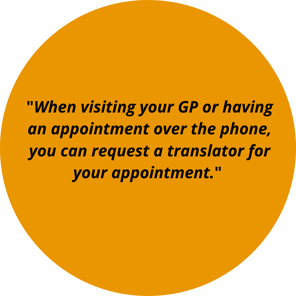 While in the UK it’s vital that you register with a GP at your local doctor’s surgery as they will likely be your first point of contact for routine health appointments and check-ups. It’s also important to know that to access your GP you do not need proof of address, proof of immigration status, ID, or national insurance number (NI).
While in the UK it’s vital that you register with a GP at your local doctor’s surgery as they will likely be your first point of contact for routine health appointments and check-ups. It’s also important to know that to access your GP you do not need proof of address, proof of immigration status, ID, or national insurance number (NI).
You can find your nearest GP surgery here. In the event of a serious accident, sudden illness or sudden pain, head straight to your nearest Hospital/A&E (Accident and Emergency department). In severe cases or if you are unable to transport yourself to A&E safely or promptly, call 999, and ask for an ambulance.
In parts of the UK, the NHS provides Walk-in or Urgent Treatment Centres which deal with all manner of minor injuries e.g., cuts, sprains, and small fractures. Here you can also receive medical advice without making an appointment usually during daytime hours. You can find your nearest walk-in or urgent treatment centres here.
If you are struggling with mental health issues, you should contact your GP. Alternatively, if you would prefer not to speak with your GP, we have listed several organisations that can help you below:
- Samaritans
- Mind
- Shout - Text 85258 to get support by text from trained volunteers
- CALM - Webchat and helpline
Social Security/Welfare Benefits
For those in financial hardship or who have specific needs, the UK has a welfare system which can be accessed through your local Jobcentre, which will also assess your eligibility regarding accessing certain benefits.
We have included a list of benefits that can be found at your local Jobcentre below :
- Universal Credit – A monthly payment for working-age people living in the UK, to help with living costs if you are on a low income or out of work.
- Pension Credit - To help with living costs if you are over the age of 66 and on a low income.
- Disability Living Allowance & other disability-related support – this covers a wide range of support depending on the individuals’ circumstances including financial support for those suffering long term physical or mental illness or disability.
- Carer’s Allowance – Financial support for those caring for someone at least 35 hours a week.
- Child Benefit – Financial support to help with the cost of raising a child.
Career Advice
Finding a job in a new country can be difficult, daunting, and time-consuming. Seeking career advice could speed up the process of finding the right job for you. Career advisors can help you find work, plan for a job, prepare for an interview, recommend courses that could help you find work and give useful tips on how to build a CV.
England
The National Careers Service is an organisation that offers career advice and information to adults in England either online or over the phone. Children aged 13+ can also seek guidance by calling 0800 100 900 for help.
Scotland
.png?width=262&name=Tip%201%20Smart%20Works%20(2).png)
The Skills Development Scotland (SDS) is an organisation where those living in Scotland can access career advice. Their helpline can be reached on 0800 917 8000.
Wales
If you live in Wales and you’re seeking career advice, Careers Wales can advise and help you with work, courses to upskill and training.
Northern Ireland
For those living in Northern Ireland, Careers Service can provide advice and guidance relating to careers.
Free online job website:
Get your professional qualification recognised in the UK
Many of you will find that, while you look for work in the UK your qualifications will be unknown to employers as they might not recognise the qualifications you have. In cases like this, you could contact the UK Centre for Professional Qualifications (UK CPQ) which is a free service that provides you with the information you need to get your qualifications from the country you studied recognised in the UK. You can call their enquiry line on 0871 226 2850.
Alternatively, if you need to find out what your qualifications UK equivalent is, you can contact UK ENIC for evidence of your overseas qualification level which can be used for employment and education.
Learning English
Learning English when you arrive in the UK is important as it will help you make the most of your time living here. If you have children you'll be better able to help them with their school work, and you will be better equipped to understand the various services available to you.
Language courses/ESOL Courses
If you have just arrived in the UK from overseas and haven’t learnt or you only know a little Englis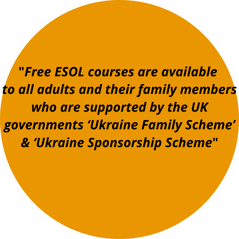 h, it would be a good idea to attend an English for Speakers of Other Languages course (ESOL Course). These courses are designed to teach you how to pronounce, write and improve your knowledge of English. They can also be used as an international qualification recognised by employers and are also the first step on your journey to further and higher education in the UK. Also, an ESOL course is a great place to meet new people!
h, it would be a good idea to attend an English for Speakers of Other Languages course (ESOL Course). These courses are designed to teach you how to pronounce, write and improve your knowledge of English. They can also be used as an international qualification recognised by employers and are also the first step on your journey to further and higher education in the UK. Also, an ESOL course is a great place to meet new people!
Where can you find English courses and ESOL courses in the UK?
ESOL courses have become commonplace in most colleges across the UK and smaller educational centres have also opened to accommodate ESOL students over the past decade. To find which colleges near you offer ESOL courses visit the ESOL website.
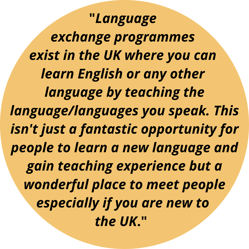 Alternatively, contact your local council who will be able to find your nearest education centre teaching ESOL.
Alternatively, contact your local council who will be able to find your nearest education centre teaching ESOL. Free ESOL courses for Ukrainian refugees can also be found here.
IELTS
The International English Language Testing System (IELTS) is a testing program to help you work, study, or migrate to a country where English is the native language. E.g., Australia, Canada, New Zealand, the UK, and the USA.
Childcare
If you have just arrived in the UK and have children below the age of 5 and want to pursue work or education in the UK, you might consider looking into what childcare options are available to you. Depending on your circumstances the government can support you with the cost of childcare and placement.
Education for children
In the UK it is compulsory that all children between the ages of 5 and 16 receive full-time education.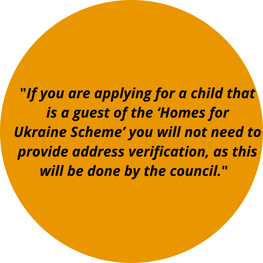
Your children can be educated by.
- A free state-funded school
- An independent school (also known as a private school or a public school) which you would have to pay for.
- Home-educate/ Home-School your child
Further education (FE)
In the UK Further Education consists of any form of study after secondary school education that isn’t an undergraduate or graduate degree which is called Higher Education. You can find out about FE courses and adult courses from the National Careers Service.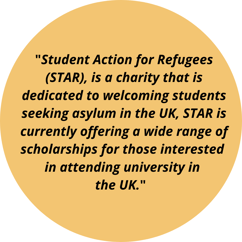
If you have entered the UK via the ‘Ukraine Family Scheme’ or the ‘Local Sponsorship Scheme for Ukraine’ and are aged 19 or above. you can still access adult education and ESOL courses. Your local college or education centre will have advisors on site that will be able to inform you of what course best fits your current level of education and what funding you are eligible for depending on your circumstances.
